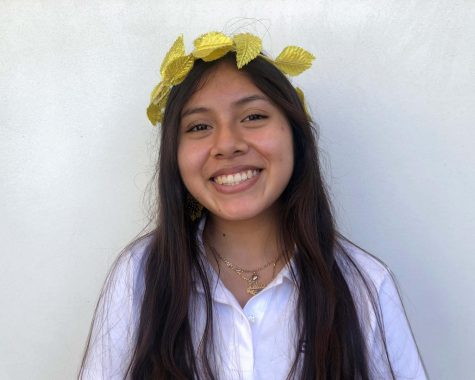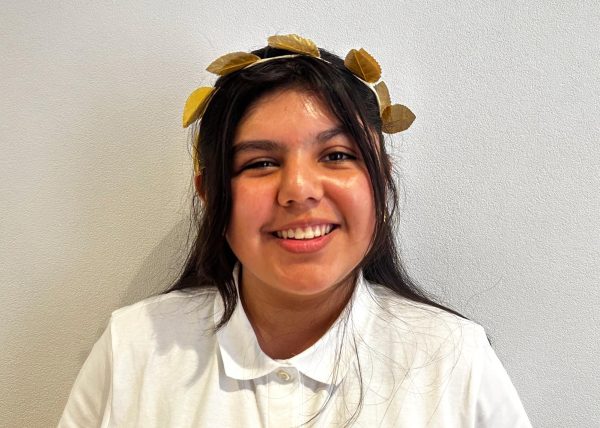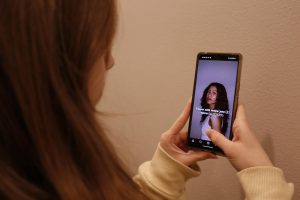‘Language is powerful’: Poetry Out Loud contest returns to Archer
Photo credit: Jullie Cach
Junior Mia Ronn performs the poem, “The World is About to End and My Grandparents are in Love,” by Kara Jackson. First, Ronn won Archer’s Poetry Out Loud contest in December and has now advanced to nationals as one of nine finalists. “I think [the poem] is so relevant and impactful. It feels like the news is constantly overwhelming our generation,” Ronn said. “With COVID, we haven’t especially gotten the same sort of teenage experience and all of the things that we sort of hoped to experience. I think we’re in a place of wondering what our lives are going to look like.”
January 7, 2022
Archer held its second annual Poetry Out Loud contest on Dec. 6, 2021, during US-FLX Block in the dining hall. The contest was judged by English teachers Stephanie Nicolard, Kathleen Bergen and English Department Chair Brian Wogensen. The contest was made up of six student participants who were all competing for a slot in the LA County Finals.
Poetry Out Loud is a national poetry contest that was brought to Archer by Bergen last year during remote learning. While Bergen taught high school on the east coast for 14 years, she led a Poetry Out Loud contest where the winners continued on to a state-level competition. When Bergen came to Archer, she discovered that Archer was unaware of Poetry Out Loud, and began crafting a proposal to encourage students to get involved.
“In my other school, we ended up going into a really high–level competition, like state-level competition, and it was really great,” Bergen said.” When I got to Archer and I found out that Archer just didn’t even really know about it, I was excited to be able to bring that opportunity here and give our students who are so talented and really good at this performance thing … the opportunity to do this — it’s really cool.”
Sophomore and theatre student Anaiya Asomugha was a contestant this year and recited “Cartoon Physics, Part 1.” Cartoon Physics is a poem that illustrates the complex concepts of animation and science that children are oblivious to and contrast such concepts with reality.
“When I’m reciting it, I think of it in a youthful yet mature manner because it deals with real topics but in a useful way — I thought [that] by the end of [my performance], people [would] think about the world and children differently,” Asomugha said. “I wanted a poem that I could relate to but also something that had so many layers that it would take a while to unpack. I think Cartoon Physics Part 1 had this youthful vibe to it, yet it was complicated and would also be challenging.”
Theatre teacher and 10th grade dean Tracy Poverstein was excited to see her theatre students participating in the show because it allowed them to further explore diverse genres and techniques, and prepared them for the upcoming play in the spring.
“I think it’s really important for them to learn to use variation in pitch, rate and volume. This is a great way to practice, especially right before upper school play auditions for ‘[A] Midsummer Night’s Dream,'” Poverstein said. “Since we’re doing a Shakespeare piece, it’s the perfect practice leading up to auditions where they really have to use the language.”
Additionally, Poverstein explained student actors’ exposure to poetry is an excellent opportunity for them to gain and boost their confidence.
“The most important thing is actually raising their confidence so they will feel more confident and be able to get up in front of a crowd of people and communicate and present,” Poverstein said. “Language is so powerful whether or not they’re actors or writers or lawyers, it’s such an important skill because you are not only being thoughtful about what you’re saying but how you present that information, is sometimes often more important than what you’re saying.”
Moving forward, Bergen hopes to see growth in engagement for the poetry contest as theatre classes and junior and senior English classes get involved.
“Next year all of the acting classes will participate and at least all of the junior and senior English classes will participate,” Bergen said. “Not that they necessarily compete but memorize and perform a poem because it’s a really good opportunity to practice your public speaking and critical thinking skills.”
In addition to the upcoming plans for next year, Bergen plans to announce the event in early May in order for students to begin brainstorming poems they want to share. Bergen explained that Poetry Out Loud is open to all and encourages everyone to try poetry, as it is a new way students can express themselves.
“The first year that I ever brought Poetry Out Loud to my school in the east coast, the student who ended up winning the school competition then won the academy competition and went into the statewide competition. [He] was a math, science kid who hated English and never understood poetry and didn’t care about it,” Bergen said. “He ended up having this opportunity and realizing, ‘Oh, I actually like this,’ — I think that sometimes you just don’t know what you will like or what you’ll be good at until you try it.”



![Junior Mia Ronn performs the poem, "The World is About to End and My Grandparents are in Love," by Kara Jackson. "I think [the poem] is so relevant and impactful. It feels like the news is constantly overwhelming our generation," Ronn said. "With COVID we haven't especially gotten the same sort of teenage experience and all of the things that we sort of hoped to experience. I think we're in a place of wondering what our lives are going to look like."Ronn originally won the school contest of the Poetry Out Loud competition last year in December and has now advanced to nationals as one of the top nine finalists.](https://archeroracle.org/wp-content/uploads/2021/12/IMG-9751-1-900x675.jpg)






